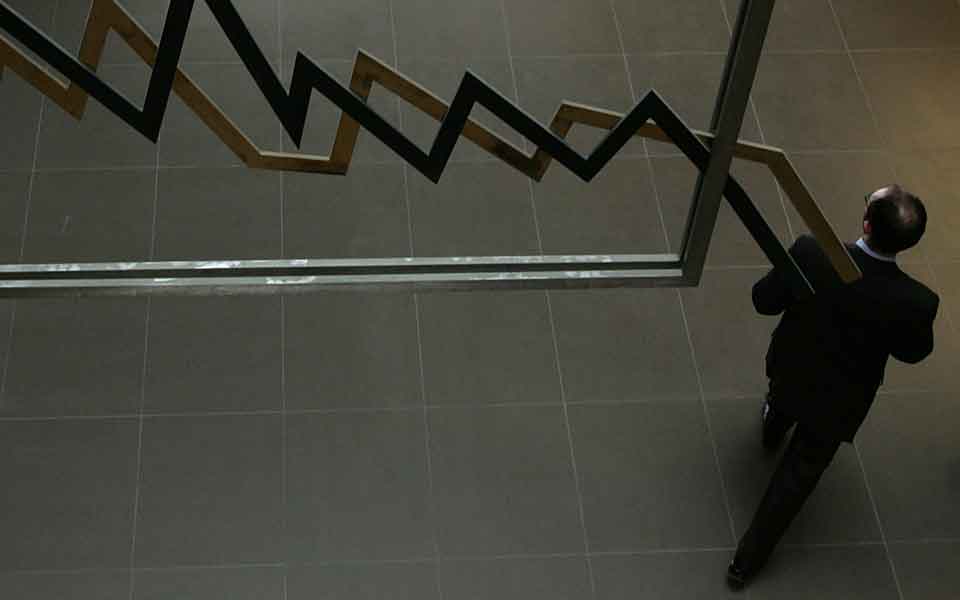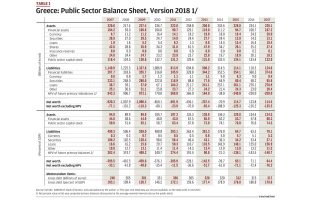Greek bonds consolidate positive momentum

The image of the Greek bond market has undergone a remarkable change compared to the days of strong pressure in 2018, as the improvement momentum built since late January has met no obstacle so far.
The twin tapping of the money markets has improved the climate and the cash flow, with turnover advancing to the level of 70 million euros per day, against 20-40 million euros a few months ago. The international companies have a “buy” recommendation, the investors listen and drive the yields of the five-year bond to a historic low of 2.6 percent and of the new 10-year note to a strongly declining course since the day of its issue, to 3.76 percent.
Fund managers and economists tell Kathimerini that the Greek bonds have become a magnet for investors thanks to external and domestic factors alike. They include the favorable international atmosphere and the yield chase by investors, the absence of political risk in Greece, the positive messages from the rating agencies and the improvement of the country’s macro image. They do note, however, that this positive trend could easily and swiftly end.
Nicholas Wall, co-manager of the Merian Strategic Absolute Return Bond Fund, Merian Global Investors, tells Kathimerini there are six main reasons international investors are buying Greek bonds. They are the following, in order of significance:
“1. The European Central Bank’s continued dovishness as inflation pressures remain absent. With many core bonds trading with negative yields, and countries like Spain and Portugal trading at tight spreads, investors are increasingly buying sovereigns with lower credit ratings to get yield in their portfolios.
2.The large cash buffer that has been built up reduces the rollover risk faced by the government, and it can comfortably cover its near-term liabilities. This, together with the long average maturity of Greece’s total debt (i.e. including official loans), makes the front end look very attractive against other sovereigns.
3.The government, in the main, continues to seek a cordial relationship with the European institutions and is proceeding with implementing the program.
4.The elections this year are not seen as a material risk. A New Democracy win would probably accelerate the spread tightening, but a victory for Prime Minister Alexis Tsipras would be OK in the medium-term if he continued to rebuild the party’s popularity on sensible, but more equitable, economic stewardship.
5.Rating agencies are catching up, and improved market access and government finances should lead to further upgrades.
6.Efforts are being made to address the legal nonperforming loan problem,” says Wall.
Fabio Balboni, a Director & Senior European Economist at HSBC Global Banking and Markets notes that “last year Greece achieved the fastest growth rate in more than a decade, and growth momentum is continuing despite the slowdown globally and particularly in the eurozone. This is good news also from a debt sustainability perspective: thanks to high growth and the strong fiscal performance, Greece’s debt-to-GDP should start falling fast from this year.”
He adds that “the country is also fully funded for the next five years or so, which is a strong reassurance against a possible risk of default, at least in the near term. Last but not least, since successfully exiting the program last August, we have not seen any meaningful slowdown in reforms, or even worse reform reversal, as some might have feared. All these are factors that have contributed to support investor confidence in recent months, and should continue to do so in the future. From a market perspective, the recent broadening of the investor base is another positive factor, as it should increase the liquidity and reduce the volatility in the Greek sovereign bond markets, in turn luring in more investors.”
A key role in the improved investor mood toward Greek bonds belongs to the particularly favorable international environment and to the completion of the ECB’s QE. As Sebastian Fellechner, analyst on Rates Markets & Sovereign Credits at DZ Bank tells Kathimerini, “first, we have to consider the current market set-up. Lately we saw no further escalation with regard to general risk factors, such as Brexit, the US-China trade dispute and the economic performance in the eurozone. Hence, a more risk-friendly sentiment dominated.”
“The slight risk-on mode helped peripheral bonds and especially Greek government bonds (GGBs). Therefore, the general market set-up is definitely one important factor, and it looms larger than some recent negative headlines (Eurogroup decision, IMF warnings, 2018 GDP figures). Investors are willing to put negative news aside. Even if, for instance, Brexit rattles market sentiment, Greece is barely affected, as the trade relationship between the two countries is less significant than for the other Eurozone states,” says Fellechner.
“In addition, GGBs benefited from the extremely low yield levels for core and semi-core bonds. 10-year Bund yields were hovering around 10 basis points during recent weeks, while the new 10y GGB offers a pick-up over Bunds of 360 basis points; of course subject to the comparatively high remaining risks.Finally, yet importantly, PSPP purchases have been missing since January, so that PSPP-eligible countries lost their comparative advantage against Greece,” concluded Fellechner.
Among the risks for Greek bonds analysts place a possible deterioration of the international climate, the handout talk by the Greek government and the possible fiscal problems from court decisions.
“Greek bonds will remain subject to general trends in risky assets, which may need a breather after performing this strongly,” argues Thomas Wacker, Head of Credit Research at UBS.
“Essentially risky assets seem to fully price a rebound in economic growth in Europe (and globally) into summer, a benign outcome on global trade disputes and Brexit. If this happens, it seems mostly priced in, if not, it can lead to a setback. Also, any resurfacing issues in Italy will likely remain a driver for Greek bonds,” he notes.
“With credit ratings for GGBs settling around high B / low BB levels, I don't see much more support from rating agencies in the near-term (maybe S&P will upgrade to BB-), so investors will likely focus on the Greek election campaigns, carefully watching out for any costly promises or challenges to past reforms,” Wacker points out.
Balboni adds that “the main risk is possible fiscal slippage related to some pending court rulings on pensions and public sector salaries and the electoral campaign about to begin (both before and after the election). This could lead to possible tensions with European authorities particularly in relation to the 2020 budget negotiations in the autumn, which could cause concerns among investors and rating agencies.
“Another possible risk – although more limited in my view – could be related to the recently agreed 11 percent increase in the minimum wage, which could hurt Greece's external competitiveness, while the external adjustment has not been completed yet in full, with Greece still having a sizable current account deficit, and an external debt in excess of 200 percent of GDP,” the HSBC official tells Kathimerini.
For Merian’s Wall, the possible risks “would be additional economic weakness in Greece, a more hawkish European Commission leadership after the EU elections, further banking system problems (such as a rejection of the Bank of Greece’s and Finance Ministry’s separate plans) or a resumption of anti-EU rhetoric from politicians, endangering program compliance.”





